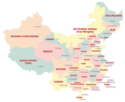Learning about China's property boom and its "ghost" cities has given me a whole new perspective on my four decades in the building, land development and consulting fields. During these periods our economy has had various ups and downs. In ‘up’ times, the rise in construction of new housing and growth in commercial developments has been quite obvious. What I have always had a problem understanding is why there seemed to be new housing projects and commercial projects that sprouted up during the bad times. read more »
China
Are Chinese Ready to Rent?
In 2010 “House price” ranked third on the list of the top 10 most popular phrases used by Chinese netizens. It came to no one's surprise. In most Chinese cities housing prices have increased significantly over the past decade, with an especially sharp rise over the past three years. read more »
A Leg Up: World's Largest Cities No Longer Homes of Upward Mobility
Throughout much of history, cities have served as incubators for upward mobility. A great city, wrote René Descartes in the 17th century, was “an inventory of the possible,” a place where people could lift their families out of poverty and create new futures. In his time, Amsterdam was that city, not just for ambitious Dutch peasants and artisans but for people from all over Europe. Today, many of the world’s largest cities, in both the developed and the developing world, are failing to serve this aspirational function. read more »
China Housing Market More Stable Than You May Think
The sensationalist reporting of rising China tends to celebrate the country’s ascent. But there is one area where both economists and casual observers see a potential disaster: the real estate market. Media reports of skyrocketing housing prices in first tier cities like Beijing and Shanghai and photo essays of Chinese ‘ghost cities’ inject sober skepticism into the otherwise bewildering reality of rapid growth. read more »
Rise of the Hans
When Chinese President Hu Jintao comes to Washington this week, there aren't likely to be many surprises: Hu and Barack Obama will probably keep their conversation to a fairly regulated script, focusing on trade and North Korea and offering the expected viewpoints on both. But seen from a different angle, everything in that conversation could be predicted, not from current events but from longstanding tribal patterns. read more »
The Dispersing of Urbanism
For more than a century, people have been moving by the millions to larger urban areas from smaller urban areas and rural areas. Within the last five years, the share of the world population living in rural areas has dropped below one-half for the first time. The migration to the larger urban areas has spread to lower income nations as the countryside seemingly empties into places like Chongqing, Jakarta and Delhi. read more »
Is China About to Decentralize?
More than a car, plane or train tick, the “Hukou” (the residential permit system) is the key to mobility in China.
I can still remember what my junior high English teacher said to my classmates and I, “I really worry about you guys; if you don’t study hard, not only will you not be able to get a job, you will probably have nowhere to stay, while the kids from the countryside; at least they will have some land to grow plants on and a house to live in!” (In my junior high school, all of my classmates had an urban hukou.) read more »
The Poverty Of Ambition: Why The West Is Losing To China And India - The New World Order
The last 10 years have been the worst for Western civilization since the 1930s. At the onset of the new millennium North America, Europe and Oceania stood at the cutting edge of the future, with new technologies and a lion’s share of the world’s GDP. At its end, most of these economies limped, while economic power – and all the influence it can buy politically – had shifted to China, India and other developing countries. read more »
China’s Urbanization: It Has Only Just Begun
In May, disgruntled workers of Honda factories in Zhongshan, southern China, went on strike at the Honda Lock auto parts factory and started posting accounts of the walkout online, spreading word among themselves and to workers elsewhere in China.
In June, Bloomberg reported that China, “once an abundant provider of low-cost workers, is heading for the so-called Lewis turning point, when surplus labor evaporates, pushing up wages, consumption and inflation.” China had depleted its surplus labor; the period of cheap labor was over. read more »
The World's Fastest-Growing Cities
The evolution of cities is a protean process--and never more so than now. With over 50% of people living in metropolitan areas there have never been so many rapidly rising urban areas--or so many declining ones.
Our list of the cities of the future does not focus on established global centers like New York, London, Paris, Hong Kong or Tokyo , which have dominated urban rankings for a generation. We have also passed over cities that have achieved prominence in the past 20 years such as Seoul, Shanghai, Singapore, Beijing, Delhi, Sydney, Toronto, Houston and Dallas-Fort Worth. read more »






















